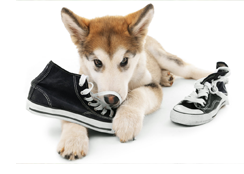
If your dog eats things that shouldn’t be eaten, like socks, dry wall, rocks and other non-food related items, then they may have a condition called Pica. While some may favour one type of thing, others can have a craving for a wide variety. Either way, Pica is worrisome in that it can cause digestive disruption, intestinal blockages and ingestion of toxins.
Dogs with Pica tend to favor items that carry their owner’s signature scent, like socks, underwear, towels or washcloths. But, scarily enough, they may also have a hankering for things like batteries, books, tissues, golf balls and more! They may even actively search for the same type of item again and again, even if eating it before has made them sick and/or in need of surgery in the past.
Diagnosing Pica
Identifying Pica is fairly simple as the signs are quite obvious; however discovering the reason for it is a whole other matter.
1. A medical condition
In some cases, there can be an underlying medical condition causing this behaviour, such as nutritional or hormonal imbalance, parasites, diabetes or thyroid problems. Therefore, a dog that presents to us with this behaviour may be given blood, urine, stool and other tests.
2. Breed
Some breeds, such as Labrador Retrievers, are naturally more prone to Pica.
3. Emotional issues
Separation anxiety, stress and boredom in dogs can show as destructive behaviour and in the process they may also be eating a significant part of what they are destroying.
Treatment and Prevention
Treatment depends on the health problem. Parasites are easily treatable and nutrient deficiency may require dietary changes or supplements. Often dogs with Pica will have digestive problems that increased nutrition can help by adding probiotics, digestive enzymes and supplements such as antioxidants to their diet.
Boredom can be counteracted with more exercise and toys and severe cases of anxiety can be eased with medical treatments. Adaptil is a very successful over-the-counter pheromone available at Pet Doctors Palm Beach that can ease stress levels.
Some cases of Pica have no clear indications of cause and simply require prevention rather than treatment.
Dogs without an underlying cause simply need not be tempted into the behaviour by removing any items from their reach and putting in preventative measures around your home and garden. This is especially important for a dog that eats objects which cause gastrointestinal obstructions.
If you have concerns about your dog’s eating habits then a simple trip to see us will help weed out any underlying problems that may be causing them.

